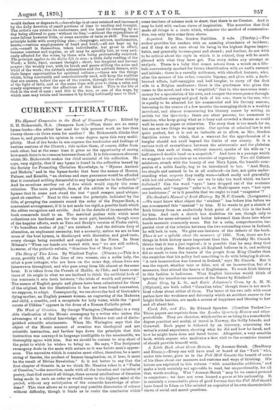The Week of Creation. By George Warington (Macmillan) is a
very able vindication of the Mosaic cosmogony by a writer who unites the advantages of a critical knowledge of the Hebrew text and of distin- guished scientific attainments. When Mr. Warington says that the object of the Mosaic account of creation was theological and not scientific instruction, and farther lays down the principle that this instruction was conveyed in language intelligible to the unscientific, we thoroughly agree with him. But we should be content to stop short of the point to which he wishes to bring us. He Bays, "The Scriptural cosmogony deals in the main with nature as it was before man's appear- ance. The narrative which it contains must either, therefore, be a more string of fancies, the product of human imagination, or, if true, it must be the result of Divine Revelation." Is it not better to say that the first chapter of Genesis is, as wo think Mr. Maurice takes it, a "Psalm of Creation,"—the assertion, made with all the iteration and variation of poetry, that God created all things, these several attributions of Creation being made in such an order as would occur to the highest mind of the period, without any anticipation of the scientific knowledge of after- time? This view allows us to accept any possible discoveries of science without difficulty, though it binds us to resist the conclusion which some teachers of science seek to draw, that there is no Creator. And it may be held with various views of inspiration. The assertion that God made all things is a truth which, whatever the method of communica- tion, can only have come from above.






























 Previous page
Previous page